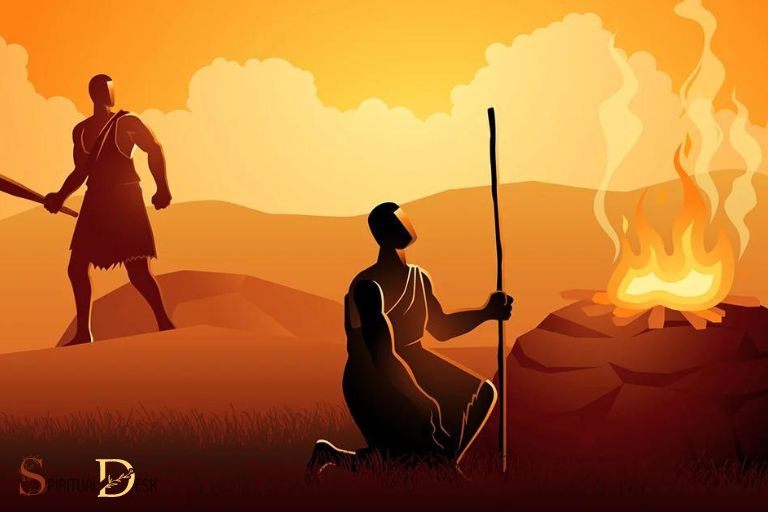What is the Spiritual Meaning of Cain And Abel?Redemption!
The spiritual meaning of Cain and Abel centers around the concept of sacrifice, the nature of sin, and the consequences of jealousy and resentment.
Cain, a farmer, represents selfishness and pride, while Abel, a shepherd, represents humility and righteousness.
In the biblical narrative, Cain and Abel are two sons of Adam and Eve, each having different occupations.
Abel is a shepherd who is favored by God due to his offering of the best of his flock. Cain, a farmer, offers fruits of the soil which are not accepted by God.
This leads to jealousy and resentment from Cain, culminating in him murdering Abel.
This story is often interpreted spiritually as a stark cautionary tale about the destructive power of jealousy and resentment, and the importance of humble sacrifice to God.
Cain and Abel’s story is more than a tale of sibling rivalry; it carries deeper spiritual connotations.
It primarily underscores the value of sincerity in offerings to the divine, showing that God values humility and righteousness over superficial offerings.
Moreover, it serves as a stern warning against harboring jealousy and resentment, emphasizing the destructive outcomes such negative emotions can lead to.
6 Aspects About the Spiritual Significance of Cain and Abel
| Aspect | Cain | Abel |
|---|---|---|
| Role | First son of Adam and Eve | Second son of Adam and Eve |
| Occupation | Farmer, cultivated the land | Shepherd, took care of the flock |
| Offering | Fruit of the ground | Firstborn of his flock and their fat portions |
| God’s Response | Disapproval, did not respect Cain’s offering | Approval, respected Abel’s offering |
| Spiritual Meaning | Represents disobedience, envy, and self-reliance | Represents obedience, humility, and faith |
| Outcome | Murdered Abel due to jealousy, became a wanderer and marked by God | Righteous man, became an example of faith and sacrifice |
Key Takeaway

Five Facts About: the Spiritual Meaning of Cain and Abel
Understanding The Characters In The Story
Cain: The Firstborn Son Of Adam And Eve
Cain, the firstborn son of adam and eve, plays a pivotal role in the story of cain and abel.
Here are some key points to understand about this intriguing character:
- Cain was the first child born to adam and eve after their expulsion from the garden of eden.
- He was a tiller of the ground, which means he worked as a farmer, cultivating crops to provide for his family.
- Cain’s name means “acquired” or “possession,” indicating the hope and expectations his parents had for him.
- Despite his privileged position as the firstborn, cain struggled with feelings of jealousy and resentment towards his younger brother, abel.
- When god accepted abel’s offering of a lamb but rejected cain’s offering of fruits and vegetables, it triggered cain’s anger and led him to commit the unimaginable: He murdered his own brother.
- Cain’s story serves as a cautionary tale about the destructive consequences of unresolved jealousy and anger.
Abel: The Second Son And Shepherd
Abel, the second son of adam and eve, is a character that highlights certain spiritual qualities.
Consider the following points about abel’s role in the story:
- Abel was a shepherd, responsible for tending and caring for the family’s flock of sheep.
- His name means “breath” or “vapor,” symbolizing the fragility and transient nature of life.
- Abel’s offering of a lamb, emblematic of innocence and sacrifice, was pleasing to god and accepted.
- Unlike his brother cain, abel possessed a humble and sincere heart, which allowed him to approach god with genuine worship and devotion.
- Abel’s tragic death at the hands of cain not only marked the first instance of violence but also echoed the sacrifice of an innocent life, foreshadowing the redemptive sacrifice of jesus christ.
Adam And Eve: The Parents And The Fall
Adam and eve, as the original parents in the biblical narrative, provide important context for understanding the story of cain and abel.
Here are some key insights about their roles and the fall:
- Adam and eve were the first human beings created by god, dwelling in the perfect paradise of the garden of eden.
- Their disobedience to god’s command not to eat from the tree of the knowledge of good and evil led to their expulsion from eden, a moment known as the fall.
- The fall introduced sin and brokenness into the world, affecting not only adam and eve but also their descendants, including cain and abel.
- As imperfect parents, adam and eve grappled with the consequences of their actions, watching as their own children struggled with jealousy, anger, and the ultimate tragedy of fratricide.
- Adam and eve’s story serves as a reminder of humanity’s fallen nature and the need for redemption and restoration.
Understanding the characters in the story of cain and abel provides insights into human nature, the consequences of sin, and the need for redemption.
Cain’s jealousy and anger, abel’s innocent sacrifice, and adam and eve’s fallen state all contribute to a narrative rich in spiritual meaning.
This biblical account serves as a timeless lesson about the destructive power of unresolved emotions and the necessity of seeking reconciliation with god and others.
Examining The Context And Setting
The Garden Of Eden: Paradise Lost
The story of cain and abel takes place in the garden of eden, the paradise where god created adam and eve.
Understanding the context and setting of this story is essential to uncovering its spiritual meaning.
- The garden of eden was a place of perfection and harmony, where adam and eve lived in close communion with god.
- God had given them dominion over all the creatures of the earth and provided them with everything they needed.
- Adam and eve enjoyed the abundance of the garden, surrounded by beauty and free from hardships or pain.
The Offering Of Sacrifices: Pleasing God
One day, cain and abel brought offerings to god, an act meant to honor and worship him. However, their different offerings had contrasting outcomes in the eyes of god.
- Abel brought the best of his flock as an offering, a lamb without blemish. This act demonstrated his obedience and reverence towards god.
- Cain, on the other hand, brought a portion of his crops, but it was not his finest produce. This implies a lack of genuine devotion and respect.
The Envy And Jealousy Between Cain And Abel: The Culmination
Cain’s offering was not accepted by god, which led to envy and jealousy towards his brother abel. This envy ultimately culminated in a tragic event and the first act of murder in human history.
- Instead of reflecting on his own deficiencies, cain’s envy consumed him, leading to resentment towards abel.
- God warned cain of the sin that was crouching at his door, urging him to do what is right. However, cain ignored the warning and allowed his jealousy to grow unchecked.
- In a fit of rage and jealousy, cain killed his brother abel, committing the gravest sin of all.
Understanding the spiritual meaning of cain and abel requires delving into the context and setting of the story.
The garden of eden represents a state of perfect harmony, while the offering of sacrifices reveals the importance of genuine devotion.
The envy and jealousy between cain and abel serve as a cautionary tale, illustrating the destructive consequences of unchecked resentment.
By examining these key elements, we can gain insight into the spiritual lessons conveyed by this ancient biblical tale.
Delving Into The Spiritual Symbolism
Abel’s Sacrifice: The Acceptance Of Faith
- Abel’s sacrifice, a lamb from his flock, represents his faith and devotion to god.
- God’s acceptance of abel’s sacrifice signifies his approval of abel’s pure intentions and obedience.
- Abel’s sacrifice symbolizes the offering of oneself to god without reservation or hesitation.
- It teaches us the importance of wholeheartedly surrendering to god’s will, trusting in his guidance.
Cain’s Sacrifice: The Rejection Of Faith
- Cain’s sacrifice, fruits from his field, symbolizes a lack of true faith and sincerity.
- God’s rejection of cain’s sacrifice indicates his dissatisfaction with cain’s half-hearted approach.
- Cain’s sacrifice highlights the dangers of offering superficial or insincere worship to god.
- It reminds us that true faith requires genuine dedication and commitment to god’s commands.
The Mark Of Cain: Consequences Of Violence
- The mark of cain serves as a visible sign of god’s punishment for cain’s act of violence towards abel.
- It signifies the separation from god’s favor and protection, leaving cain to face the consequences of his actions.
- The mark also acts as a warning to others, a reminder of the devastating consequences of violence and disobedience.
- It reminds us of the importance of choosing love, forgiveness, and compassion over anger, revenge, and violence.
By analyzing the spiritual symbolism behind cain and abel’s story, we can draw valuable lessons about faith, worship, and the consequences of our actions.
Abel’s sacrifice demonstrates the acceptance of faith and the importance of wholehearted devotion to god, while cain’s sacrifice represents a lack of sincerity and true faith.
The mark of cain serves as a warning against violence and disobedience, reminding us of the need for love, forgiveness, and compassion in our interactions with others.
May we all strive to follow abel’s example, offering our hearts and lives to god, while heeding the cautionary tale of cain’s choices.
Exploring The Lessons And Interpretations
The Battle Of Good And Evil: Inner Conflict
In the story of cain and abel, we encounter a timeless battle between good and evil, which ultimately reflects the inner conflict that exists within each of us.
Here are the key points to consider:
- The nature of good and evil: The tale of cain and abel highlights the contrasting nature of good and evil. Abel, as the righteous brother, represents goodness, while cain embodies the darkness of evil. This duality serves as a reminder that these elements coexist within ourselves.
- The power of choice: The story prompts us to question the choices we make in our own lives. Cain’s jealousy and subsequent murderous act illustrate the consequences of giving in to negative emotions. It reminds us that we have the power to choose between right and wrong and that the choices we make shape our character.
- The struggle for self-control: Cain’s inner conflict reflects the struggle we all face in maintaining self-control. Jealousy consumed him, leading him to commit a heinous act. This serves as a reminder of the importance of mastering our emotions and channeling them in a positive direction.
- Finding resolution within: The story of cain and abel teaches us that true resolution can only be found by addressing our inner conflicts. By acknowledging and working through our negative emotions, such as jealousy, we can find peace and restore balance in our lives.
Cain And Abel As Archetypes: Jealousy And Forgiveness
Cain and abel represent powerful archetypes within the story, embodying the themes of jealousy and forgiveness.
Here are the key points to consider:
- Jealousy as a destructive force: The character of cain demonstrates the destructive power of jealousy. Consumed by envy towards his brother’s favor, cain’s jealousy leads him down a path of violence. This serves as a cautionary tale about the negative consequences of allowing jealousy to control our actions.
- Abel’s forgiveness as an act of grace: Despite the harm caused by cain, abel displays a remarkable act of forgiveness. This act serves as a powerful example of grace and compassion, demonstrating the ability to overcome anger and seek reconciliation.
- Lessons in forgiveness: Abel’s forgiveness challenges us to examine our own capacity to forgive. It highlights the healing power of forgiveness, both for the one who seeks forgiveness and the one who grants it.
- The transformation of cain: The story of cain and abel also presents the opportunity for redemption and personal transformation. Through repentance and seeking forgiveness, cain is given the chance to change his ways and find redemption.
The Redemption And Reconciliation: Finding Spiritual Balance
The story of cain and abel ultimately teaches us about finding spiritual balance through redemption and reconciliation.
Here are the key points to consider:
- Taking responsibility for our actions: Cain’s journey towards redemption begins with taking responsibility for his actions. By acknowledging his wrongdoing and seeking forgiveness, he opens the door to personal growth and reconciliation.
- Seeking reconciliation with others: The story emphasizes the importance of seeking reconciliation with others. Just as cain was given the opportunity for redemption, we too can find healing in our relationships by actively seeking forgiveness and making amends for the harm we have caused.
- Finding peace within: The tale of cain and abel teaches us that true redemption and reconciliation begin with finding peace within ourselves. By addressing our inner conflicts and striving to live a righteous life, we can cultivate a sense of spiritual balance and harmony.
- Learning from the past: The story serves as a lesson to learn from the past and avoid repeating destructive patterns. Through introspection and self-reflection, we can break free from negative cycles and strive towards personal transformation.
Remember, the lessons and interpretations derived from the story of cain and abel have the potential to guide us in our own spiritual journeys.
By understanding the battle of good and evil within ourselves, embodying forgiveness, and seeking redemption, we can strive towards a more balanced and fulfilling existence.
FAQ About The Spiritual Meaning Of Cain And Abel
What Is The Spiritual Meaning Of Cain And Abel?
The story symbolizes the struggle between good and evil, jealousy, and the consequences of sin.
Why Did Cain Kill His Brother Abel?
Cain killed abel out of jealousy and anger when god accepted abel’s offering but rejected cain’s.
What Can We Learn From The Story Of Cain And Abel?
The story teaches us about the importance of offering our best and not giving in to jealousy and anger.
How Does The Story Of Cain And Abel Relate To Spirituality?
It reminds us of the consequences of our actions, the need for forgiveness, and the power of redemption.
What Is The Significance Of Cain Becoming A Wanderer?
Cain’s wandering represents his separation from god, a constant reminder of the consequences of his actions.
Conclusion
The story of cain and abel holds deep spiritual meaning that resonates with individuals across different cultures and religions.
It serves as a reminder of the consequences of envy, resentment, and the destructive power of negative emotions.
By delving into this biblical narrative, we gain insight into the universal struggles of humanity.
The tale highlights the importance of self-reflection and the pursuit of spiritual growth, urging us to confront our inner demons and strive for righteousness.
Through the lens of cain and abel, we learn that our actions have significant consequences, both for ourselves and those around us.
The story calls us to examine our own lives and relationships, encouraging us to foster love, empathy, and understanding.
By embracing these timeless lessons, we can embark on a journey of personal transformation and contribute to the creation of a more compassionate world.
Bonus: The Spiritual Meaning Of Cain And Abel
What Is The Symbolism Of Cain And Abel?
The story of Cain and Abel is one of the most well-known stories in the Bible. In it, two brothers offer sacrifice to God. Abel’s sacrifice is accepted while Cain’s is not.
This leads to Cain murdering Abel in a fit of jealousy.
There are a number of different interpretations of this story, but one common theme is that it represents the battle between good and evil. On one side is Abel, who represents all that is good.
He offers a pure and innocent sacrifice to God. On the other side is Cain, who represents all that is evil. His offering is tainted with sin and violence.
This story teaches us that even though evil may seem to be winning at times, ultimately good will prevail.
What Is The Purpose Of A Cain?
A cain is a tool that is used to help in the process of breaking up and turning over soil. It is also used for digging holes and trenches for planting.
The cain has a long handle with a pointed end that helps to make it easier to use.
What Does Abel Represent In The Bible?
The name Abel comes from the Hebrew word meaning “son.” In the Bible, Abel was the firstborn son of Adam and Eve. He was a shepherd who offered God a sacrifice of his best lambs.
His brother Cain, a farmer, offered God some of his crops. God accepted Abel’s offering but not Cain’s. This made Cain very angry. He killed Abel out of jealousy.
What Does The Story Of Cain And Abel Symbolize?
The story of Cain and Abel is a story that has been told for centuries. It is a story that has been used to symbolize the relationship between good and evil, between God and Satan.
The story goes like this: ain was the firstborn son of Adam and Eve. Abel was the second born. Both were farmers.
Cain offered some of his crops as a sacrifice to God while Abel offered his best lamb. God accepted Abel’s offering but not Cain’s. This made Cain very angry so he killed Abel out of jealousy.
When God asked Cain where Abel was, he replied that he did not know but said, “Am I my brother’s keeper?”
God then put a curse on Cain which caused him to be exiled from the land. He became a wanderer with no home or family.
The story of Cain and Abel symbolizes the struggle between good and evil, between God and Satan. It shows how jealousy can lead to violence and death.
It also teaches us that we are all responsible for our actions and must face the consequences of our choices.
What Is The Main Lesson Of The Cain And Abel Story?
The Cain and Abel story is a popular story that has been told for centuries. It is a story about two brothers who were born into a family of farmers.
The eldest brother, Cain, was a very successful farmer, while the younger brother, Abel, was not as successful.
One day, Cain became very angry with Abel because he felt that Abel was not working hard enough on the farm. Cain ended up killing Abel in a fit of rage.
The moral of the story is that jealousy and envy can lead to terrible consequences. This is why it is so important to control our emotions and to treat others fairly.
Story Of Cain And Abel Summary
The story of Cain and Abel is one of the most well-known stories from the Bible. In it, we learn about the first murder that took place, as well as God’s reaction to it. Cain was a farmer, and Abel was a shepherd.
One day, they each offered a sacrifice to God. Abel’s sacrifice was accepted, but Cain’s was not. Cain became very angry and jealous, and he killed Abel out of envy.
God spoke to Cain after he had killed his brother, asking him where Abel was. When Cain replied that he didn’t know, God said that he would be punished for his crime.
He would no longer be able to farm the land, and he would become a wanderer.
Cain left home and eventually settled in a city called Nod. There he fathered a son named Enoch. The story of Cain and Abel teaches us about the consequences of sin, as well as God’s forgiveness and mercy.
Cain And Abel Bible Verse
The Cain and Abel Bible verse is found in Genesis 4:1-16. In this passage, God asks Cain where his brother Abel is and Cain responds that he does not know.
God then tells Cain that Abel’s blood is crying out to him from the ground and that he will be cursed because he has sinned.
Cain is angry and jealous of his brother Abel because God accepts Abel’s offering but not his own. So, he kills Abel out of envy.
When God confronts Cain about Abel’s murder, He places a mark on Cain to protect him from being killed in revenge by anyone who finds him.
This story teaches us that jealousy and anger can lead to terrible things if we let them get out of control. We also see God’s mercy towards sinners even when they don’t deserve it.






